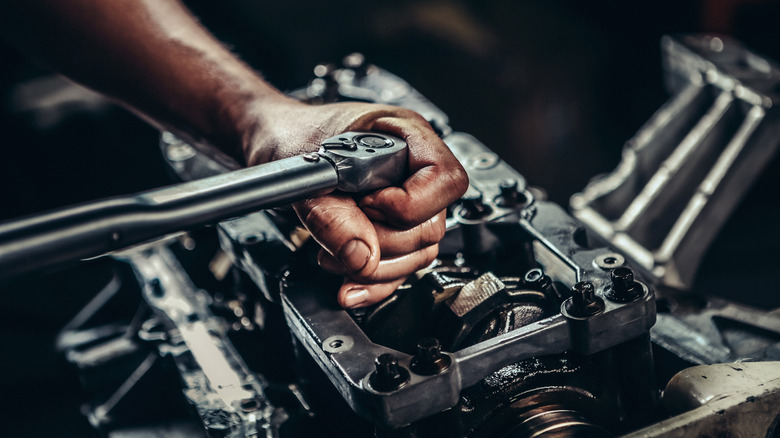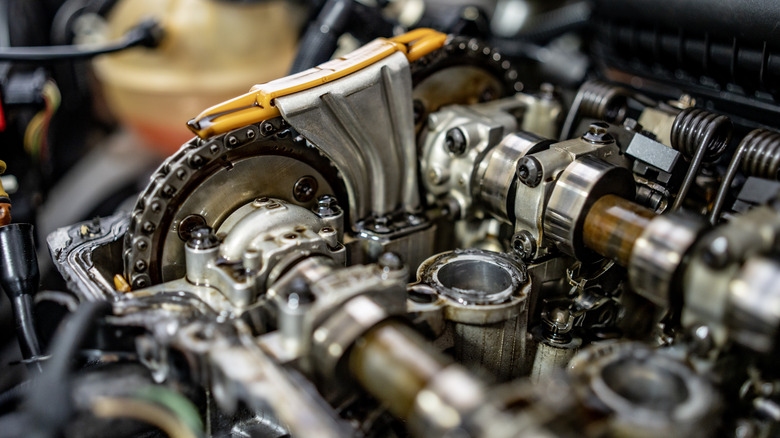Can You Rebuild A High Mileage Engine?
Can you rebuild an engine that's been through the ringer? This is a question I've often been asked when I worked as a mechanic, and one I've had to confront directly as someone who exclusively uses classic cards as daily drivers. The average automobile's internal combustion engine, no matter how many cylinders it has, is an incredibly complex component, and it can be a nightmare to dismantle depending on the make and model. However, for some cars, it's not always feasible to just replace the engine if yours wears out. Maybe it's too expensive, or it's a particularly rare block. Whatever the case, you're then looking at a full rebuild.
Yes, it is possible to rebuild your own engine. I've done it several times for my '73 Volkswagen, for instance. That engine is held in by exactly four bolts on the transmission housing, so you just unbolt it and rock it back and forth off the transmission shaft until it drops on a mattress in the driveway. Other cars I've done this procedure with are far more involved, like my Jeep, for example, but when you have over 200,000 miles on a car over 30 years old, parts will inevitably break.
This calls into question when it's actually necessary to dismantle a whole engine, as opposed to just putting a new one in. The simplest answer is money. If you have the expertise and facilities, it's less expensive to rebuild your own engine than to swap. In this article, I'll define "High Mileage" as any car with a mileage over its warranty, i.e., a car with a 100,000-mile warranty that reads over 100,000 miles.
What rebuilding your engine involves
This isn't necessarily to discourage anyone, just inform them of the process awaiting them. Dismantling an engine requires a host of specialized tools and skills, especially when it comes time to rebuilding it. You'll need to do all your own timing, parts fitting, and so on. Many of these tasks are not intuitive practices. That said, most internal combustion engines operate essentially identically, meaning the skills are easily transferable, apart from oddball configurations like Wankels, a configuration which Mazda has teased several times as being more than just a glorified generator.
Basically, you'll be looking at one of two options if you want to rebuild a high-mileage engine: either a long time spent with a messy garage or a large hole in your wallet. Engine rebuilds vary widely in terms of pricing, though they almost invariably cost upwards of several thousand USD for something like a 5.7L V8, one of the most common rebuilds I've seen in the shop when I was working. It doesn't take too long to actually perform the job; a skilled tech can finish a rebuild in less than a week of clock time.
Obviously, things only get simpler the farther back you go, though that isn't always the case, especially for cars from around the 80s and early-90s, which use labyrinths of vacuum lines. But many cars from before then were essentially just engines with carbureted fuel systems and mechanical cable-actuated control surfaces like throttles. If you're learning, it's best to start there, in my opinion.
Why you'd need to rebuild an engine
Engines give off various warning signs to tell you they may need a rebuild. For example, if you find glitter-like metal shavings in your engine oil, that likely means that one of a number of internal components may be failing, such as piston rings, connecting rods, camshaft components, and so forth. Similarly, if you hear a persistent knocking sound, known colloquially as "rod knock," thick exhaust smoke likely caused by contaminated fuel, and several other symptoms, all could indicate that your engine's bottom-end needs repairs.
Letting such issues run their course almost invariably leads to a seized engine, or at the very least the engine not working as intended, with significant performance losses, strange noises, and other factors contributing to what is best described as a "dying car." If the rest of the car is in good shape, or it's particularly rare, then an engine rebuild or replacement is a viable option, and will generally restore your engine to a reasonable condition. It won't be factory-new, however. That's a different service, called remanufacturing.
Much like how rebuilding a transmission versus buying a used transmission goes, there are pros and cons associated with rebuilding an engine that largely mirror this. Sometimes it's simply cheaper to just buy an engine in better shape and install that than it is to repair the existing engine, for example. Alternatively, rebuilding an engine is an excellent learning tool for intermediate-level at-home mechanics, as long as you're comfortable with buying new tools for the job.


